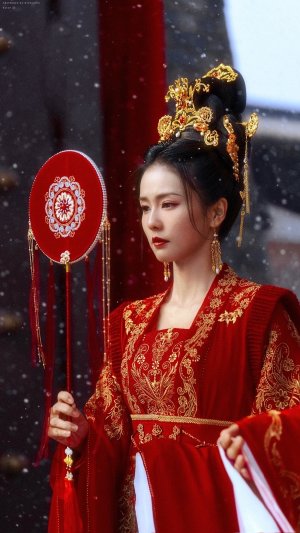This review may contain spoilers
Plot holes and constant scheming mended by the leads good look
There’s just something magnetic about Zhang Wanyi — that voice, textured like velvet stretched over steel, demanded your attention before you even realised you were giving it. When he was serious, it dropped low and heavy, like a storm about to break. And when he teased Jiang Si, it lifted — lighter, almost playful, but never losing that quiet authority. He didn’t need theatrics to take over a scene; his voice alone could thread menace, warmth, and irony all in a single breath. And yes — the face helped. Striking bone structure, eyes that could look empty one moment and wreck you the next. No notes.
But Si Jin wasn’t just about voice and presence. It dug deeper — into bleaker truths, especially through Jiang Yu, the Second Sister. She wasn’t some cartoon villain. She was what happened when years of degradation blurred your sense of right and wrong. Trapped in a cruel marriage, reduced to survival mode, she enabled horrors just to keep breathing. It was horrifying — but heartbreakingly human. Because sometimes self-justification was the only thing left standing between you and the truth. And in a world where walking away brought more shame than staying, where decorum mattered more than safety, even victims clung to illusion. Si Jin didn’t excuse it — it just looked it straight in the eye.
That rot ran deeper, though. The Marquis of Changxing’s family wasn’t just powerful — they were untouchable. They didn’t face consequences; they erased them. Abuse? Disappeared. Murders? Covered. And when their monstrous son finally got exposed, the Marchioness offered a masterclass in denial: “Oops, parenting is hard.” No guilt. No shame. Just panic over a tarnished name. In this world, justice was optional — reputation, sacred.
And then there was Jiang Si — walking back into life, shadowed by a doomed love. She tried to stay away from Yu Qi, but her heart never quite listened. Both of them were marked from birth, seen as burdens, not blessings. But somehow, they still found each other in the ruins. That love, fragile but real, felt like defiance. Like a flicker of light in a world built to snuff it out.
Also, give Er Niu his flowers — the fluffiest wingman in the genre. In the novel, he’s a tiny general on secret missions, bartering for snacks. A scene-stealer with paws.
That love triangle moment at the store opening ? Gold ! Yu Qi — usually Mr. Cool— completely lost his composure, all because he wanted to impress Jiang Si. Smoothing his sleeves, trying (and failing) to look casual, throwing little dagger glares at Lord Zhen every time he dared speak to her — he was a mess. And Lord Zhen? Equally stressed, equally desperate for her attention, playing the polite, charming gentleman while Yu Qi stood there fuming silently, like, “Why is he even breathing the same air as her?” These two men were having a whole invisible rivalry war while Jiang Si was just out there trying to sell fragrances. She 100% knew they were both acting weird and competing like lovesick puppies, but she pretended not to see it because it was too deliciously awkward to interrupt. Honestly, I need more love rivals acting like children over the calmest, most oblivious queen in the room. Jiang Si wins without lifting a finger.
Amid all the chaos, Jiang Si’s relationship with her father was a warm little pocket of safety and peace. He believed in her, defended her, never let superstition cloud his love. When she spoke gently about her sister — “She married the wrong man. It’s unfortunate” — you saw her compassion. But her father’s quiet reply hit harder: “We can't control our luck, but when misfortune befalls us, we can at least make the right choices.” A reminder that victimhood does not erase agency, that suffering doesn’t strip away responsibility. Bad things happen. But righteousness is a choice, not a privilege of the lucky.
Also... What is it with Jiang daughters and their taste in husbands? Emotional torture, violent control, humiliation — the family might as well have taken out a Platinum Membership at the "Abusive and Deranged Husbands for Daughters Club™" and renewed it annually. And the worst part isn’t even just that they’re trapped; it’s that they seem to cherish their chains. Like, “Oh no, I’m suffering horribly... but at least I have a husband...” Hello??? Is the bar in hell? Because back then, being married — no matter how awful — was still seen as better than being alone. That mindset? Si Jin drags it into the light and rips it apart. Fortunately, Jiang Si didn’t just break the pattern — she shattered it. She chose freedom, dignity, and her own damn path. That’s Queen behaviour.
But Si Jin wasn’t just about voice and presence. It dug deeper — into bleaker truths, especially through Jiang Yu, the Second Sister. She wasn’t some cartoon villain. She was what happened when years of degradation blurred your sense of right and wrong. Trapped in a cruel marriage, reduced to survival mode, she enabled horrors just to keep breathing. It was horrifying — but heartbreakingly human. Because sometimes self-justification was the only thing left standing between you and the truth. And in a world where walking away brought more shame than staying, where decorum mattered more than safety, even victims clung to illusion. Si Jin didn’t excuse it — it just looked it straight in the eye.
That rot ran deeper, though. The Marquis of Changxing’s family wasn’t just powerful — they were untouchable. They didn’t face consequences; they erased them. Abuse? Disappeared. Murders? Covered. And when their monstrous son finally got exposed, the Marchioness offered a masterclass in denial: “Oops, parenting is hard.” No guilt. No shame. Just panic over a tarnished name. In this world, justice was optional — reputation, sacred.
And then there was Jiang Si — walking back into life, shadowed by a doomed love. She tried to stay away from Yu Qi, but her heart never quite listened. Both of them were marked from birth, seen as burdens, not blessings. But somehow, they still found each other in the ruins. That love, fragile but real, felt like defiance. Like a flicker of light in a world built to snuff it out.
Also, give Er Niu his flowers — the fluffiest wingman in the genre. In the novel, he’s a tiny general on secret missions, bartering for snacks. A scene-stealer with paws.
That love triangle moment at the store opening ? Gold ! Yu Qi — usually Mr. Cool— completely lost his composure, all because he wanted to impress Jiang Si. Smoothing his sleeves, trying (and failing) to look casual, throwing little dagger glares at Lord Zhen every time he dared speak to her — he was a mess. And Lord Zhen? Equally stressed, equally desperate for her attention, playing the polite, charming gentleman while Yu Qi stood there fuming silently, like, “Why is he even breathing the same air as her?” These two men were having a whole invisible rivalry war while Jiang Si was just out there trying to sell fragrances. She 100% knew they were both acting weird and competing like lovesick puppies, but she pretended not to see it because it was too deliciously awkward to interrupt. Honestly, I need more love rivals acting like children over the calmest, most oblivious queen in the room. Jiang Si wins without lifting a finger.
Amid all the chaos, Jiang Si’s relationship with her father was a warm little pocket of safety and peace. He believed in her, defended her, never let superstition cloud his love. When she spoke gently about her sister — “She married the wrong man. It’s unfortunate” — you saw her compassion. But her father’s quiet reply hit harder: “We can't control our luck, but when misfortune befalls us, we can at least make the right choices.” A reminder that victimhood does not erase agency, that suffering doesn’t strip away responsibility. Bad things happen. But righteousness is a choice, not a privilege of the lucky.
Also... What is it with Jiang daughters and their taste in husbands? Emotional torture, violent control, humiliation — the family might as well have taken out a Platinum Membership at the "Abusive and Deranged Husbands for Daughters Club™" and renewed it annually. And the worst part isn’t even just that they’re trapped; it’s that they seem to cherish their chains. Like, “Oh no, I’m suffering horribly... but at least I have a husband...” Hello??? Is the bar in hell? Because back then, being married — no matter how awful — was still seen as better than being alone. That mindset? Si Jin drags it into the light and rips it apart. Fortunately, Jiang Si didn’t just break the pattern — she shattered it. She chose freedom, dignity, and her own damn path. That’s Queen behaviour.
Was this review helpful to you?


 1
1










